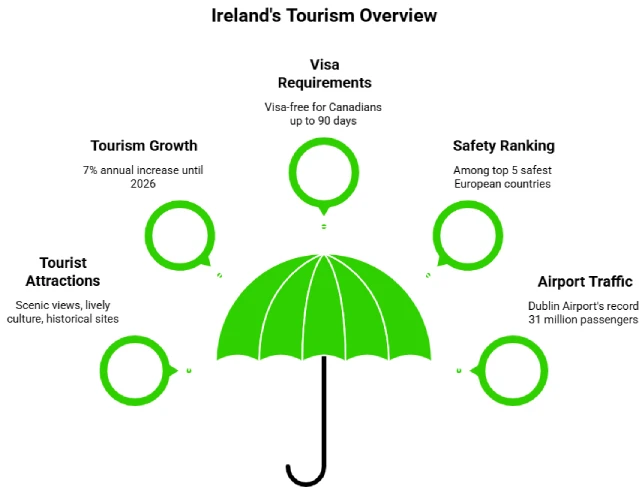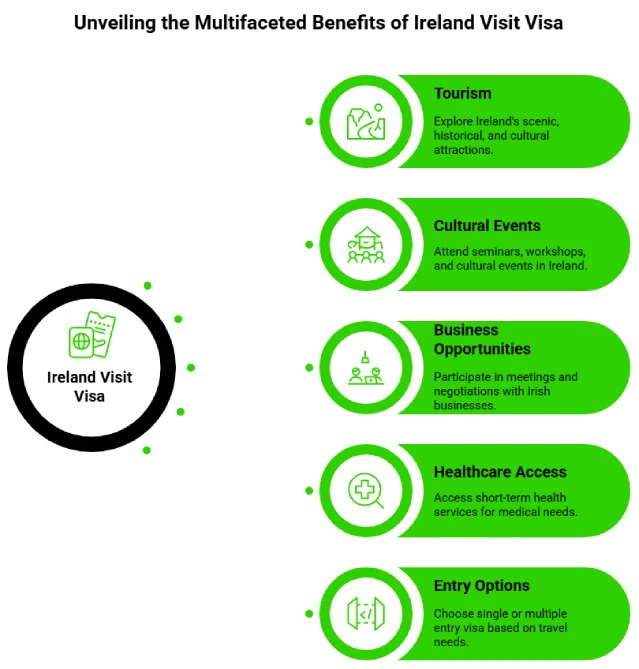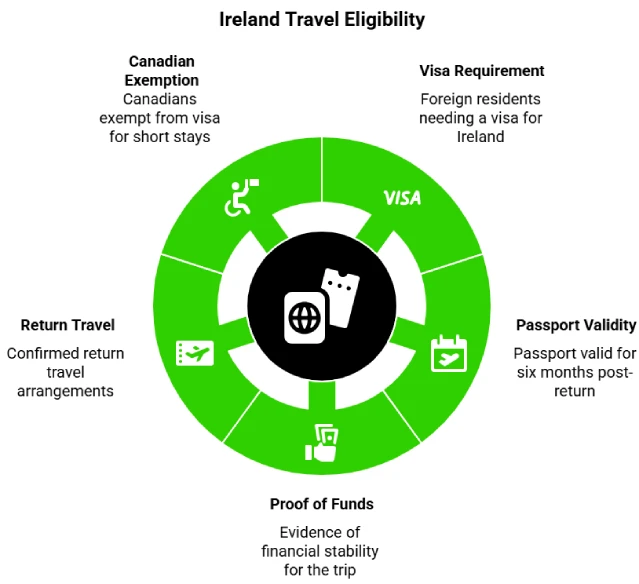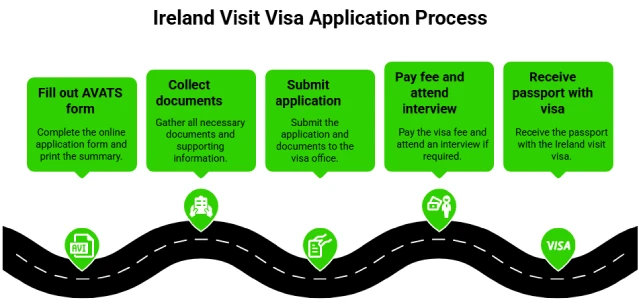Ireland draws many international tourists with its scenic views, lively culture, and historical sites. If you're planning a trip for vacation, family visits, work, or medical reasons, knowing Ireland's visa rules will help you avoid problems.

*Want assistance to apply for an Ireland Visit Visa? Sign up with Y-Axis for comprehensive support with the process.
An Ireland Visit Visa, or ‘C’ visa, lets people from countries outside the EU/EEA/Switzerland who need a visa enter Ireland for up to 90 days. People usually use it for tourism, seeing family or friends, business meetings or short courses, or getting medical care. People with this visa cannot work, study for long periods, or use public services in Ireland. They have to leave before the visa runs out.
To get an Ireland Visit Visa, people must show they plan to return home after their visit. They also need to have enough money for their stay and a place to stay in Ireland. Depending on why they are coming, they might get a visa for one entry or, sometimes, for many entries. People from some countries, such as the US, Canada, and Australia, do not need a visa for short visits, but still have to meet the standard requirements when they enter Ireland.
For Canadians, Ireland mixes current urban living with old historical places well.
The benefits offered by an Ireland Visit Visa are given below.

Ireland offers various types of visit visas, depending on the applicant’s purpose of visiting Ireland. Some of the popular types of Irish visit visas are:
The Ireland Tourist Visa, a short-term visa (Category ‘C’), permits people from countries outside the EU/EEA/Switzerland who require a visa to enter Ireland for tourism for a maximum of 90 days. This visa is for tourism, vacations, or seeing family and friends. Visa holders can't work, study, or use state services in Ireland. Applicants must show proof of enough money, where they will stay, and that they plan to go back home before the visa runs out.
The Ireland Family or Friend Visit Visa, a short-stay visa (Category ‘C’), enables people from countries outside the EU/EEA/Switzerland who need a visa to visit Ireland for up to 90 days to see family or friends. This visa is for social visits only. People with this visa cannot work, study, or use public services in Ireland. Those applying must give proof of their relationship to the person they plan to visit, give details about where they will stay, show they have enough money for the trip, and prove they plan to go home before the visa expires.
An Ireland Business Visa, a short-stay visa (Category ‘C’), allows people from outside the EU/EEA/Switzerland, who need a visa, to visit Ireland for business reasons for up to 90 days. Business activities can include meetings, conferences, negotiations, or contract signings. Note that this visa does not allow holders to work, get paid employment, or use public services in Ireland. People applying need to show proof of their business reason for travel, like an invitation from an Irish company, lodging details, proof of enough money, and confirmation that they plan to leave Ireland before the validity of the visa expires.
An Ireland Conference or Event Visa, a short-term visa (Category ‘C’), permits non-EU/EEA/Swiss citizens from countries that need a visa to enter Ireland for up to 90 days. It is intended for attending conferences, seminars, workshops, cultural events, or similar gatherings. This visa is specifically for event participation; it does not allow holders to work, do paid activities, or use public services in Ireland. Applicants must show proof of event registration or invitation, lodging details, evidence of enough funds for the stay, and a pledge to leave Ireland before the visa ends.
An Ireland Medical Treatment Visa, a short-stay visa (Category ‘C’), allows non-EU/EEA/Swiss citizens from countries that need a visa to come to Ireland for medical care for up to 90 days. This visa is for people who can show they need treatment, have made plans with a recognized Irish medical center, and have enough money for treatment and living costs while in Ireland. Visa holders can't work, study, or use public services other than their approved medical care. They must also prove they plan to leave Ireland after treatment or when their visa expires.
An Ireland Transit Visa is for people from non-EU/EEA/Swiss countries who need to go through an Irish airport to get to somewhere else. It's for those who don't plan to enter Ireland itself. With this visa, you can only stay in the airport's international transit area. You can’t leave the airport or go through Irish border control. When you apply, you will need to show your travel plans, including a visa for your final destination, if needed, and proof that you are going there.
To visit Ireland, you must fulfil the following eligibility criteria.

To apply for Ireland Visit Visa, you must submit the following documents.
The step-wise procedure to apply for an Ireland Visit Visa is given below.
Step 1: Fill out the AVATS online form and print the summary.
Step 2: Collect all needed documents and supporting Information.
Step 3: Submit your application and documents to the Irish Visa Office or consulate.
Step 4: Pay the fee for the visa, and if needed, go to an interview.
Step 5: Receive your passport with the Ireland visit visa.

Detailed information about the visit visa fees of Ireland is given below.
| Visa Type | Fee |
| Short‑stay ‘C’ Single‑Entry | € 60 |
| Short‑stay ‘C’ Multiple‑Entry | € 100 |
| Transit Visa (airport transit only) | € 25 |
Detailed information about the processing time for Ireland Visit Visas is given below.
| Visa Type | Processing Time |
| Short-stay ‘C’ Single-Entry Visa | 8 weeks |
| Short-stay ‘C’ Multiple-Entry Visa | 8 weeks |
| Transit Visa | 8 weeks |
The validity and duration of stay offered by Ireland Visit visas are given below.
| Visa Type | Validity Period | Maximum Duration of Stay |
| Short-stay ‘C’ Single-Entry Visa | Valid for travel within 90 days | Up to 90 days in Ireland |
| Short-stay ‘C’ Multiple-Entry Visa | Valid for travel within 90 days | Up to 90 days per visit |
| Transit Visa | Valid for travel on transit date(s) only | Stay in airport transit area only |
Yes, Ireland Visit Visa can be extended. Visa extensions for Ireland are typically granted only in unusual situations, like medical emergencies or humanitarian crises. You must submit your application to the Irish Naturalisation and Immigration Service (INIS) before your current visa runs out, and you'll need to include supporting documents. It's worth noting that requests for extensions due to tourism or business trips usually are not approved.
Y-Axis is a well-known immigration and visa consultancy that helps people with their travel, education, job, and relocation needs. With years of practical experience, they give skilled advice on visa procedures, paperwork, and application tactics for many countries, such as Ireland.
Our services include:
The documents required to apply for an Ireland Visit Visa are given below.
The costs of an Ireland Visit Visa are given below.
| Visa Type | Fee |
| Short‑stay ‘C’ Single‑Entry | € 60 |
| Short‑stay ‘C’ Multiple‑Entry | € 100 |
| Transit Visa (airport transit only) | € 25 |
The differences between a single-entry and multiple-entry Ireland Visit Visa are given below.
| Feature | Single-Entry Visit Visa | Multiple-Entry Visit Visa |
| Number of Entries Allowed | Allows one entry into Ireland only. | Allows multiple entries within the visa validity period. |
| Purpose | For travelers who plan to enter Ireland once and stay. | For travelers who need to leave and re-enter Ireland repeatedly. |
| Common Use | Standard for most applicants such as tourists or family visits. | Granted in limited cases like frequent business travel or special circumstances. |
| Validity Period | Valid for a single trip within the approved travel dates. | Valid for multiple trips during its validity period. |
| Approval Likelihood | Most commonly issued type of visa. | Approved only in exceptional cases with strong justification. |